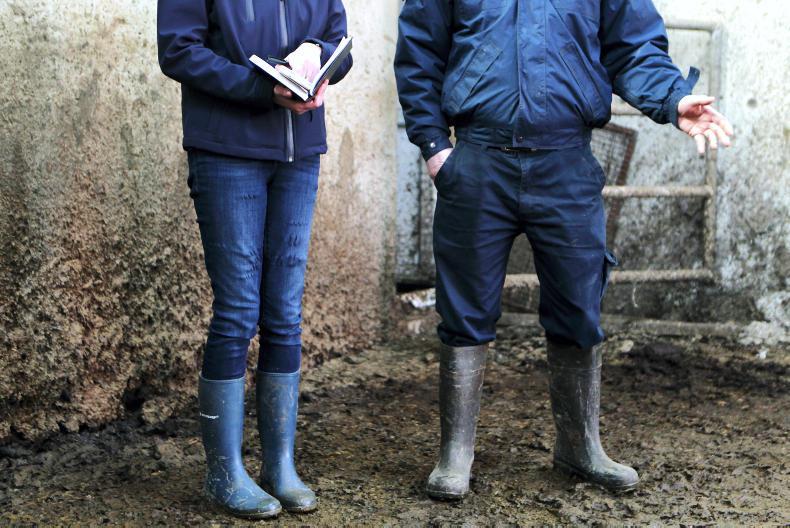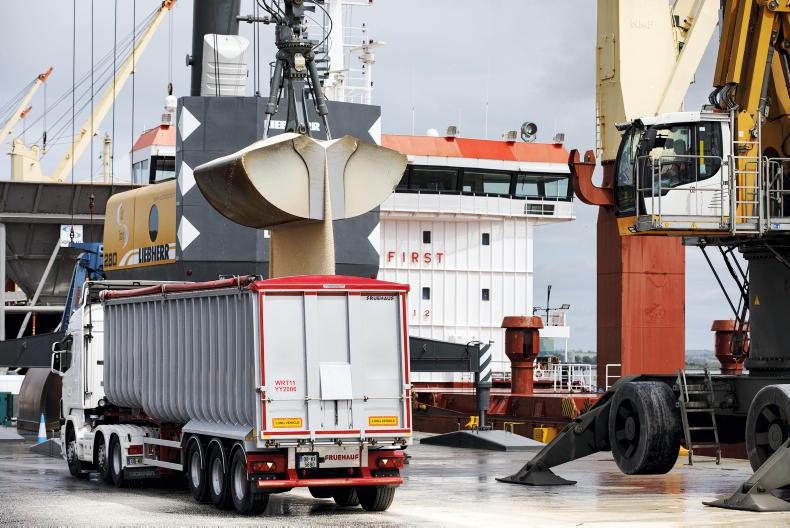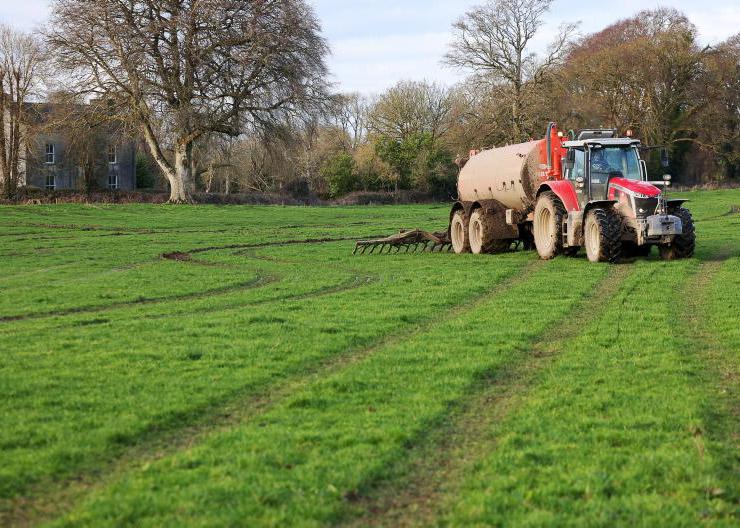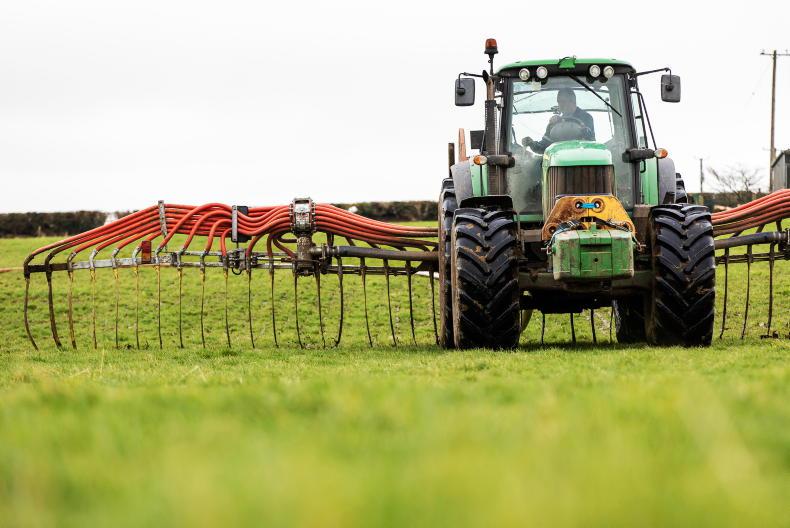Tougher rules for larger farms, a crackdown on inadequate slurry storage and tighter monitoring of fertiliser sales are among the measures being considered in a review of Ireland’s nitrates laws.
A public consultation on a review of Ireland’s Nitrates Action Programme (NAP), which gives effect to the nitrates regulation, was announced on Wednesday.
The regulations expire at the end of 2021 and a new NAP must be approved by the European Commission to be published at the beginning of 2022.
The review document highlights that the next review will take place “in the context of significant greater environmental ambition” in the programme for government and at EU level.
It says a regime similar to that for pesticides where sales are recorded on a farm-by-farm basis will be considered for fertiliser. On top of detailed farm logs, merchants selling pesticides are required to record each farm’s purchases, a record which Department inspectors can access to ensure compliance.
Slurry crackdown
The review states that “it has become clear in the past number of years that the slurry storage available on farms is not always sufficient”.
The required slurry storage period for farms will be reviewed in the coming months. These range from 16 weeks in the southeast to 22 weeks in Cavan and Monaghan.
The regulations expire at the end of 2021 and a new NAP must be approved by the European Commission to be published at the beginning of 2022
The practice of exporting slurry to comply with stocking rates needs “a full assessment”, the document says.
The impact of these 5,511 farms is to be examined and additional controls considered.
Larger herds are in the crosshairs due to “an increasing disparity between those with the largest herds in the country and those other farmers that are running average-sized herds”.
The Department asks if additional measures should be considered to mitigate the potential pressures these farms create.
Stocking rates
The Department wants to review “grazing intensity relative to whole farm stocking” based on the latest research available. The Irish Farmers Journal detailed last week that stocking rates on the grazing platform would be put under the microscope.
A milking platform stocking limit would hit many farms, particularly fragmented ones and those relying on zero-grazing.
The Department highlighted that zero-grazing is being adopted by more and more farms and there will be a review of “best practice for grazing and nutrient management”.
The most recent derogation review seen an upward revision of the excretion rate for dairy cows from 85kg N to 89kg N per cow. A full assessment of excretion rates for all animals is being considered along with the figures used to calculate slurry storage capacity and permitted fertilisation rates.
Mandatory training
The review document questions whether regulations that require farmers to prevent cattle access to watercourses should be extended. From 1 January 2021 all farms stocked above 170kg N/ha will be required to fence watercourses 1.5m from the top of the riverbank or water’s edge.
A mandatory training requirement was introduced for all derogation farmers in 2020.
The Department asks if extending this requirements to all farmers would have an impact on water quality.
One element highlighted for inclusion in training courses is nutrient management planning (NMP).
Derogation farmers in are required to complete a nutrient management plan and the review says mainstreaming these tools further “will be a key component of any successful NAP”.
Submissions
The Department has also outlined its intention to complete an interim review of the NAP towards the end of 2023.
The public consultation is now open and the closing date for receipt of submissions is 15 January 2021.
Those making a submission to the consultation should email wau@housing.gov.ie.
Read more
Public consultation opens on Nitrates Action Programme
New rules for highly stocked farmers
No EPA licensing for dairy farms – McConalogue
Tougher rules for larger farms, a crackdown on inadequate slurry storage and tighter monitoring of fertiliser sales are among the measures being considered in a review of Ireland’s nitrates laws.
A public consultation on a review of Ireland’s Nitrates Action Programme (NAP), which gives effect to the nitrates regulation, was announced on Wednesday.
The regulations expire at the end of 2021 and a new NAP must be approved by the European Commission to be published at the beginning of 2022.
The review document highlights that the next review will take place “in the context of significant greater environmental ambition” in the programme for government and at EU level.
It says a regime similar to that for pesticides where sales are recorded on a farm-by-farm basis will be considered for fertiliser. On top of detailed farm logs, merchants selling pesticides are required to record each farm’s purchases, a record which Department inspectors can access to ensure compliance.
Slurry crackdown
The review states that “it has become clear in the past number of years that the slurry storage available on farms is not always sufficient”.
The required slurry storage period for farms will be reviewed in the coming months. These range from 16 weeks in the southeast to 22 weeks in Cavan and Monaghan.
The regulations expire at the end of 2021 and a new NAP must be approved by the European Commission to be published at the beginning of 2022
The practice of exporting slurry to comply with stocking rates needs “a full assessment”, the document says.
The impact of these 5,511 farms is to be examined and additional controls considered.
Larger herds are in the crosshairs due to “an increasing disparity between those with the largest herds in the country and those other farmers that are running average-sized herds”.
The Department asks if additional measures should be considered to mitigate the potential pressures these farms create.
Stocking rates
The Department wants to review “grazing intensity relative to whole farm stocking” based on the latest research available. The Irish Farmers Journal detailed last week that stocking rates on the grazing platform would be put under the microscope.
A milking platform stocking limit would hit many farms, particularly fragmented ones and those relying on zero-grazing.
The Department highlighted that zero-grazing is being adopted by more and more farms and there will be a review of “best practice for grazing and nutrient management”.
The most recent derogation review seen an upward revision of the excretion rate for dairy cows from 85kg N to 89kg N per cow. A full assessment of excretion rates for all animals is being considered along with the figures used to calculate slurry storage capacity and permitted fertilisation rates.
Mandatory training
The review document questions whether regulations that require farmers to prevent cattle access to watercourses should be extended. From 1 January 2021 all farms stocked above 170kg N/ha will be required to fence watercourses 1.5m from the top of the riverbank or water’s edge.
A mandatory training requirement was introduced for all derogation farmers in 2020.
The Department asks if extending this requirements to all farmers would have an impact on water quality.
One element highlighted for inclusion in training courses is nutrient management planning (NMP).
Derogation farmers in are required to complete a nutrient management plan and the review says mainstreaming these tools further “will be a key component of any successful NAP”.
Submissions
The Department has also outlined its intention to complete an interim review of the NAP towards the end of 2023.
The public consultation is now open and the closing date for receipt of submissions is 15 January 2021.
Those making a submission to the consultation should email wau@housing.gov.ie.
Read more
Public consultation opens on Nitrates Action Programme
New rules for highly stocked farmers
No EPA licensing for dairy farms – McConalogue









SHARING OPTIONS